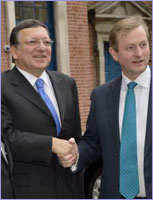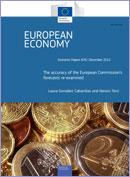|
|
|
|
|
|
 |
 |
 |
 |
President Barroso welcomes priorities for Ireland’s EU presidency
In a speech on 16 January before a plenary session of the European Parliament, European Commission President José Manuel Barroso welcomed the priorities outlined by Irish Prime Minister Enda Kenny for Ireland’s EU presidency. This followed meetings with the Irish cabinet in Dublin on 10 January and Vice-President Rehn's speech of 11 January. During his speech at the Parliament, Barroso welcomed the fact that Ireland has placed stability, growth and jobs at the heart of its presidency. While going on with steps to deepen economic and monetary union, Barroso said the EU must pursue fiscal consolidation, enact economic reforms for competitiveness and also make targeted investments for growth. Above all, he said, Europe needs to tackle the very serious social situation in many Member States. Barroso also urged adoption, within the next few weeks, of the Single Supervisory Mechanism and the multi-annual financial framework, the EU’s next seven-year budget. As engines for growth and employment, President Barroso stressed the importance of the Single Market Act 2 legislation, the action plan for entrepreneurship and expanded trade ties.
|
 |
 |
 |
|
 |
 |
 |
 |
 |
|
 |
 |
 |
Stability, growth and jobs: these are the priorities Ireland has set for the Presidency programme, priorities which I very much welcome and which have been at the heart of the Commission's actions since the start of the crisis.
José Manuel Barroso
President of the European Commission |
 |
|
|
|
 |
 |
 |
 |
Economic sentiment improves in the euro area and remains broadly stable in the EU
In December the Economic Sentiment Indicator (ESI) improved by 1.3 points in the euro area, to 87.0 and remained broadly unchanged (+0.3 points) at 88.4 in the EU. Economic sentiment in the euro area improved among consumers and across all sectors, except retail trade. In the EU, economic sentiment registered increases in industry and construction, which were partly offset by decreases in services and retail trade. EU consumer confidence remained broadly unchanged. Amongst the seven largest Member States, economic sentiment improved in Italy (+2.0), Germany (+1.0) and France (+0.4) and remained broadly stable in Spain (+0.3), the Netherlands (+0.2) and Poland (-0.2). Only the UK saw sentiment clearly declining (-3.5). Industry confidence increased for the second month in both the EU (+1.4) and the euro area (+0.6), fuelled by a much more positive assessment of production expectations and, to a lesser extent, the current level of overall order books. The European Commission publishes the Business and Consumer Survey Results every month, as well as quarterly survey results for the manufacturing industry and consumers.
|
 |
|
 |
 |
|
 |
 |
 |
 |
European Parliament approves news rules on credit rating agencies
The European Parliament approved new rules on 16 January that will make Credit Rating Agencies (CRAs) more transparent when they rate sovereign states and accountable for mistakes in case of gross negligence. Based on proposals put forward by the Commission in November 2011, the new rules aim to improve the quality of credit ratings, reduce overreliance on ratings, prevent conflicts of interest and increase competition in a market dominated by just a few firms. To avoid sudden market movements, rating agencies will set up a calendar indicating when they will rate Member States and they will be limited to three unsolicited sovereign ratings per year. Finally, to increase transparency, the European Securities and Markets Authority (ESMA) will centralise all available ratings on a European Rating Platform, which will allow investors to compare ratings and make their own credit risk assessment. The new rules will enter into force after formal adoption by the Council and 20 days after publication in the Official Journal of the European Union.
|
 |
|
 |
 |
|
 |
 |
 |
 |
EU launches new Platform for blending funds in external cooperation
The EU has established a new platform to provide recommendations and guidance on the use of blending in external cooperation. Blending combines EU grants with other public and private sector resources such as loans and equity in order to leverage additional non-grant financing. In the platform announced on 21 December 2012, technical groups including the European Commission, the European Investment Bank (EIB), other European bilateral and multilateral financial institutions and private sector financial institutions will review existing blending mechanisms and work together on the development of a common results based framework to measure impact. Since 2007, EU grant contributions to individual projects have leveraged more than EUR 20 billion of loans by eligible financial institutions, unlocking project financing of at least EUR 45 billion. Vice-President Olli Rehn, said: “By standardising approaches and scaling up activities with partners there is the potential to reduce transaction costs of all involved, further improving the positive impact achieved in our cooperation activities with countries around the world.”
|
 |
|
 |
 |
|
 |
 |
 |
 |
Unemployment rates rise in both the euro area and EU, to 11.8% and 10.7% respectively
Unemployment rates have risen markedly compared with November 2011 in both the euro area and the EU, according to figures released on 8 January by Eurostat, the statistical office of the European Union. The euro area seasonally-adjusted unemployment rate was 11.8% in November 2012, up from 10.6% in 2011, while the EU unemployment rate was 10.7%, up from 10.0% in 2011. Unemployment in the euro area rose from 11.7% in October 2012 and remained stable in the EU. Eurostat estimates that 26 billion men and women in the EU, of whom 18.8 billion were in the euro area, were unemployed in November 2012. Since November 2011, unemployment has risen by 2 billion in both the EU and the euro area. Compared with a year ago, the unemployment rate increased in eighteen Member States, fell in seven and remained stable in Denmark and Hungary. The lowest unemployment rates were recorded in Austria (4.5%), Luxembourg (5.1%), Germany (5.4%) and the Netherlands (5.6%), and the highest in Spain (26.6%) and Greece (26.0% in September 2012). The difficult employment situation is addressed in the newly released 2012 edition of the Employment and Social Developments in Europe Review.
|
 |
|
 |
 |
|
 |
 |
 |
 |
December euro area inflation stable at 2.2%
Euro area annual inflation was 2.2% in December 2012, the same as in November, according to data released on 16 December by Eurostat, the statistical office of the European Union. EU annual inflation was 2.3% in December 2012, down from 2.4% in November. A year earlier the rate was 3.0%. Monthly inflation was 0.3% in December 2012. In December 2012, the lowest annual rates were observed in Greece (0.3%), Sweden (1.1%), France and Cyprus (both 1.5%), and the highest in Hungary (5.1%), Romania (4.6%) and Estonia (3.6%). Compared with November 2012, annual inflation rose in eleven Member States, remained stable in four and fell in eleven. The main components of euro area inflation with the highest annual rates in December 2012 were alcohol & tobacco (3.6%), housing (3.4%), food and education (both 3.0%), while the lowest annual rates were observed for communications (-3.8%), household equipment (1.0%) and recreation & culture (1.2%).
|
 |
|
 |
 |
|
 |
 |
 |
 |
ESM holds its first 3-month bill auction, launching short-term funding programme
The European Stability Mechanism (ESM) launched its short-term funding programme on 8 January with a 3-month bill auction. The auction was met with strong demand, attracting over EUR 6.2 billion in bids, which implies a high bid/cover ratio of 3.2. The ESM sold EUR 1.9 billion in 3-month bills at a weighted average price of 100.00819% and with a maturity of 11 April 2013. The weighted average yield was negative at -0.0324%. This new ESM bill programme will replace the existing EFSF bill programme and the EFSF will no longer hold bill auctions. The ESM will initially focus on 3-month and 6-month bills and regular bill auctions will be held on Tuesdays.
|
 |
|
 |
 |
|
 |
 |
 |
 |
European Investment Bank capital increase approved by all 27 EU Member States
The European Investment Bank (EIB) announced on 8 January that its shareholders, the 27 EU Member States, have unanimously approved a EUR 10 billion capital increase, which will be fully paid in. The capital increase will allow Europe’s long-term lending institution to provide up to EUR 60 billion in additional lending, over a 3-year period, for economically viable projects across the EU. In early 2012 the European Council asked the EIB to examine how to increase support for growth, and the June 2012 European Council recommended that the bank’s capital be strengthened to allow an increase in lending activity. Additional capital will be paid in by each Member State according to their current shareholding. The additional lending will target four priority sectors and be dedicated to supporting innovation and skills, SMEs, clean energy and modern infrastructure. The new financing comes on top of the EIB’s EUR 50 billion in regular annual lending.
|
 |
|
 |
 |
|
|
|
|
 |
 |
 |
 |
The accuracy of the European Commission's forecasts re-examined. European Economy. Economic Paper 476
This paper analyses the Commission’s forecast track record, by building on previous analyses. The extension of the observation period to 2011 allows a first analysis of forecast accuracy during the years of the economic and financial crisis. Moreover, the paper also expands its analysis to the twelve Member States that joined the European Union in 2004 and 2007. Over the full timespan, forecasts for the EU and euro area, as well as for individual Member States, are found to be generally unbiased. Furthermore, the Commission’s forecast track record appears to be generally in line with that of the OECD, IMF and Consensus Economics, and in some cases better. Finally, while the analysis points to a limited impact of the crisis on the accuracy of the Commission’s current-year forecasts, a significant deterioration of the accuracy of year-ahead projections is found, mainly due to larger forecast errors in the recession year 2009, which by all standards proved exceptional and unanticipated by both institutional and market forecasters.
|
|
 |
 |
|
|
|
|
|
|
|
|
|
|
|
 |
| Directorate-General for Economic and Financial Affairs |
 |
|